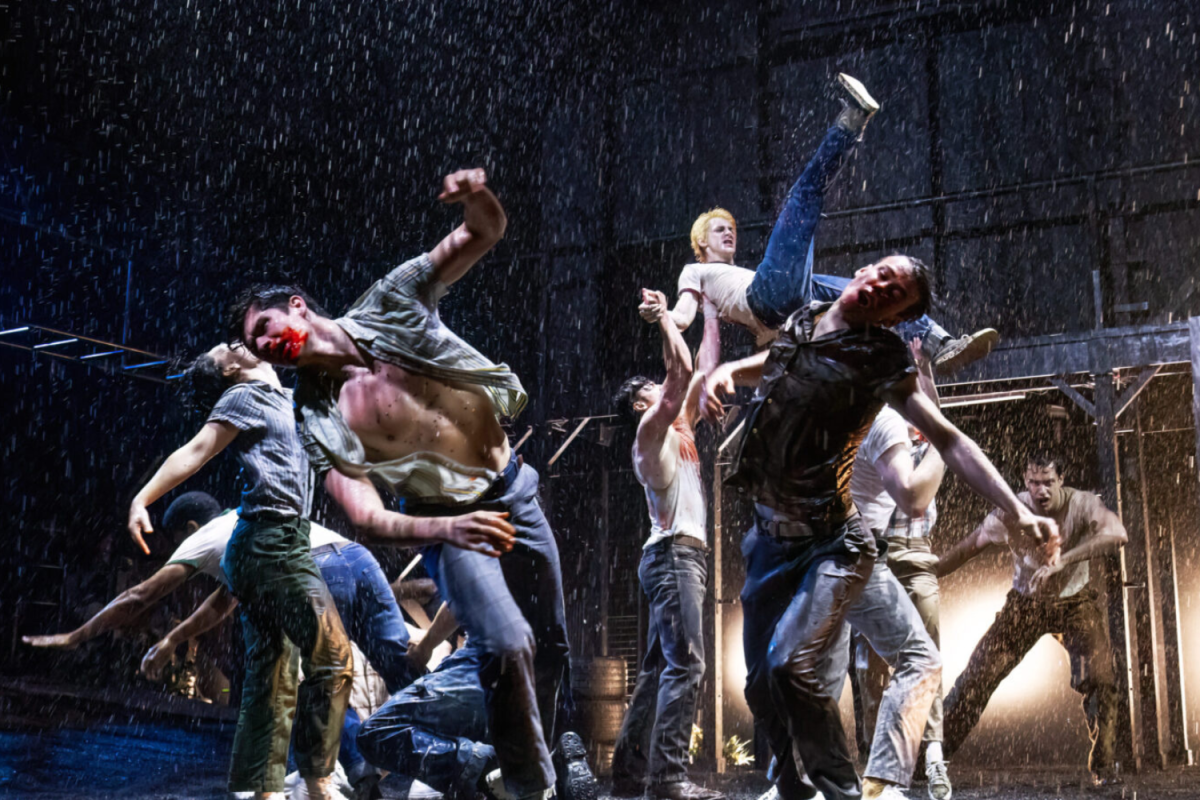While NYU’s newest campus is bringing New Yorkers to Tulsa, “The Outsiders” on Broadway brings Tulsa to New York. The story first came to life as a novel written by S.E. Hinton, who grew up in the city and completed the book by age 17. The Broadway musical, which features a textured score that blends folk and rock, is the newest in a series of adaptations of the tale, which includes a 1983 film directed by Francis Ford Coppola.
The show tells the story of Ponyboy Curtis (understudy Trevor Wayne) and his fellow Greasers, a clique of young, working-class men living in Tulsa’s East Side known for their bad reputation and the grease with which they do their hair. They typically find themselves in opposition to the Socials, nicknamed Socs, the well-to-do and often malicious upper-crust kids of the West Side. Ponyboy, 14, is introspective and sincere, and still reeling from the train crash that killed his parents less than a year prior — leaving him to live with his older brothers, Sodapop (understudy Victor Carrillo Tracey) and Darrel (Brent Comer). Despite his willingness to abandon the Greaser act, Ponyboy has just joined the gang’s ranks when he and his best friend, Johnny Cade (Sky Lakota-Lynch), become involved in a crime prompted by Soc hostility, forcing the two cliques into all-out suburban warfare.
The Greasers and Socs clash incessantly against a set composed of moveable blocks and beams. Characters use wooden planks to assemble and reconstruct cultural staples of the city, like a drive-in theater, as well as the abandoned church in which much of the show’s second act unfolds. In an attempt to best capture the story’s geographic and physical movements, versatility is the name of the game: A beat-up car on the stage’s corner also serves as the bed Ponyboy shares with Sodapop, situating itself comfortably in both the show’s flashiest and most intimate moments. When Ponyboy and Johnny flee the city by jumping a moving train in “Run Run Brother,” their escape is depicted through frantic scenic shifts. Greasers and Socs alike climb and swing across the set’s metal skeleton, sometimes elevating themselves to a secondary stage where they overlook the events unfolding below. While the two groups are divided by class and social standing, their collective participation in the stage’s transmutation serves to unite them.
In converting the novel — which is told in entirety from Ponyboy’s perspective — to a musical, songs provide omniscience to the audience and delve more intensely into supporting characters through performance. The eldest, Darrel, is a high school football prodigé now “stuck between the role of a brother and a father” following their parents’ death, as he puts it in “Runs in the Family.” His industrious drive to keep his remaining family intact, love for his brothers and underlying resentment for his circumstances manifest in numbers like “Throwing in the Towel.” Elevated by Comer’s soaring baritone, Darrel’s heightened role in the show allots more sympathy to his character and supplements some of the musical’s strongest numbers. The relationship between Ponyboy, Sodapop and Darrel takes on a richer, resonant tone in the musical, and their ongoing efforts to piece together their home lives in their parents’ absence take center stage through poignant and sometimes painful interactions between the three. The brothers’ affiliation with the Greasers grants them the camaraderie of strong-hearted friends, but when it comes to family bonds, it keeps them stagnant. Conflict with the Socs is, perhaps, a more predictable battle to fight than that against grief.
Amongst other accolades, “The Outsiders” received 2024 Tony Awards for best lighting and sound design. Both elements are most often brought to the show’s forefront in moments of conflict, working in tandem to depict visceral moments of violence. A scene in which Ponyboy is kicked unconscious strikes viewers with a dissonant soundscape, the stage awash in pallid lighting, creating punctuation that evokes both tension and sympathy. The infamous rumble, a choreographed yet savage brawl between Greasers and Socs, serves as the show’s physical and emotional zenith. It allows the audience to bear witness to the emotional whirlwind through flashes of light and sound — locomotive noises amidst the violence further an ongoing train motif within the show, showing that the emotional proximity between Ponyboy and his parents’ accident remains. Rain pours down on the stage as actors brawl in real dirt, caked in sludge and blood as they call out to their friends. Through its naturalistic and layered depiction of relationships, “The Outsiders” never lets the audience forget that the musical’s characteristic grief and hatred is unfolding between kids, rendering the story especially harrowing.
Ponyboy’s angst and aspirations are universal, and when set to the show’s lush score, it becomes clear that the honesty of Hinton’s work has been preserved. The newest reincarnation of “The Outsiders” places deliberate emphasis on how feelings of camaraderie, love and grief can be so easily misdirected in youth, showing that the tale’s nature is evergreen.
Contact Eleanor Jacobs at [email protected].
























































































































































